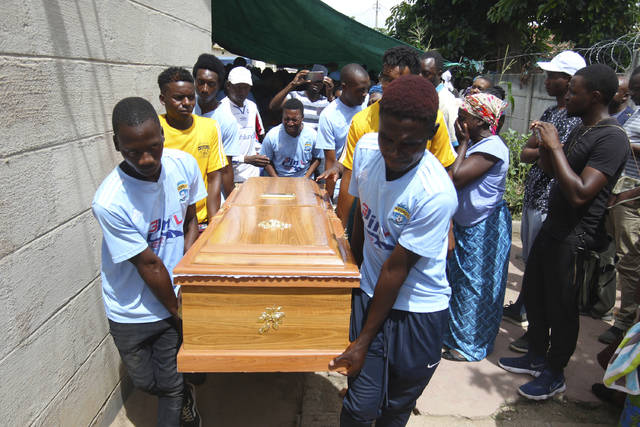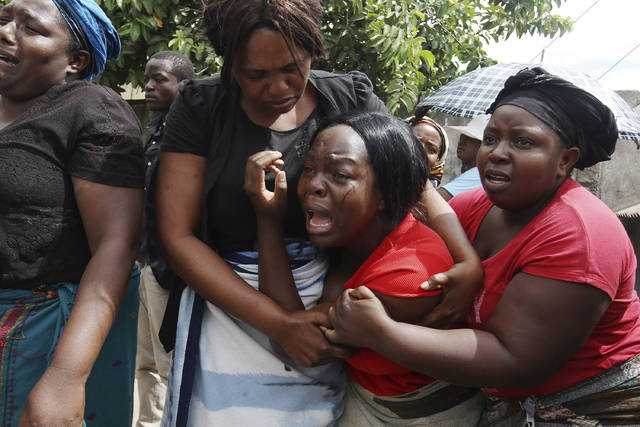‘I’ve been robbed by the state:’ Zimbabwe, in chaos, mourns

Soccer teammates of Kelvin Tinashe Choto react, during his funeral in Chitungwiza, about 30 kilometres south east of the capital, Harare, Zimbabwe, Saturday, Jan, 19, 2019. Before the family of Kelvin Tinashe Choto knew he had been killed, social media in Zimbabwe was circulating a photo of his battered body lying on the reception counter of a local police station. Angry protesters had left him there. The 22-year-old was shot in the head, one of at least a dozen people killed since Monday in a violent crackdown by security. (AP Photo/Tsvangirayi Mukwazhi)

Soccer teammates of Kelvin Tinashe Choto carry his coffin, during his funeral in Chitungwiza, about 30 kilometres south east of the capital, Harare, Zimbabwe, Saturday, Jan, 19, 2019. Before the family of Kelvin Tinashe Choto knew he had been killed, social media in Zimbabwe was circulating a photo of his battered body lying on the reception counter of a local police station. Angry protesters had left him there. The 22-year-old was shot in the head, one of at least a dozen people killed since Monday in a violent crackdown by security. (AP Photo/Tsvangirayi Mukwazhi)

A family member of Kelvin Tinashe Choto reacts, during his funeral in Chitungwiza, about 30 kilometres south east of the capital, Harare, Zimbabwe, Saturday, Jan, 19, 2019. Before the family of Kelvin Tinashe Choto knew he had been killed, social media in Zimbabwe was circulating a photo of his battered body lying on the reception counter of a local police station. Angry protesters had left him there. The 22-year-old was shot in the head, one of at least a dozen people killed since Monday in a violent crackdown by security. (AP Photo/Tsvangirayi Mukwazhi)
HARARE, Zimbabwe — Before the family of Kelvin Tinashe Choto knew he had been killed, social media in Zimbabwe was circulating a photo of his battered body lying on the reception counter of a local police station. Angry protesters had left him there.
HARARE, Zimbabwe — Before the family of Kelvin Tinashe Choto knew he had been killed, social media in Zimbabwe was circulating a photo of his battered body lying on the reception counter of a local police station. Angry protesters had left him there.
The 22-year-old was shot in the head, one of at least a dozen people killed in the past week in a violent crackdown by security forces on protests against a dramatic increase in fuel prices.
Dozens of Zimbabweans have been shot . Others say they have been hunted down in their homes at night, with soldiers and masked men in plainclothes dragging them away, severely beating them and leaving them for dead.
Some are activists and labor leaders. Others, like Choto, have just been in the wrong place at the wrong time. A captain of a small soccer club in Chitungwiza, a satellite city southeast of the capital, Harare, he had been planning to travel to neighboring South Africa next week to look for better-paying teams.
“He was our future,” said his father, Julius Choto, as the family buried him on Saturday. Teammates chanted the team’s war cry, handed the family his jersey and carried his coffin. “He was disciplined, respectable and nonviolent. All he cared for was his football. He was a very good footballer.”
His son had been watching the protests from a soccer field, “some meters away from the action,” on Tuesday when he was gunned down.
“Maybe they thought he was an (opposition) activist since he was wearing a red Manchester United jersey,” his father told The Associated Press.
The family only discovered his body the following morning at a local mortuary.
“I have been robbed,” his father said, crying. “He was my only son and his future was bright. I have been robbed by the state.”
Such accounts have undermined the faith of many Zimbabweans in the government of President Emmerson Mnangagwa, who was cheered when he took over after the ouster of longtime, repressive leader Robert Mugabe in late 2017. Since then, the country’s already staggering economy has weakened even more.
Growing frustration over rising inflation, a severe currency crisis and fuel lines that stretch for miles finally snapped after Mnangagwa announced a week ago that fuel prices would more than double, making gasoline in Zimbabwe the most expensive in the world.
Civic leaders called for Zimbabweans to stay at home for three days in protest. Other people took to the streets. Some looted, in desperation or anger. The military was called in, and with Mnangagwa leaving on an extended overseas trip, the hard-line former military commander and Vice President Constantino Chiwenga was left in charge. A crackdown began.
In what critics have called an attempt to cover up abuses, the government in the past few days has imposed an internet shutdown across the country, ordering internet service providers and telecommunications firms to block popular social media apps or everything at once.
“The internet was a tool that was used to coordinate the violence,” presidential spokesman George Charamba asserted on state television Saturday night, referring to protesters.
The internet shutdowns have given security forces cover to commit violations “away from the glare of the international community,” said Dewa Mavhinga, southern Africa director for Human Rights Watch.
The reports of abuses came as Mnangagwa prepared to attend the World Economic Forum in Davos, Switzerland, to appeal for foreign investment in a country he repeatedly says is “open for business.”
On Sunday after growing pressure, Mnangagwa announced that he would skip Davos and return home “In light of the economic situation,” saying the first priority was to get the country “calm, stable and working again.”
The violent crackdown has sent a different message from the one the president wished to give foreign investors. At one hospital in Harare alone, the waiting room and corridors were packed with victims.
“They came at the middle of the night, kicking doors and throwing tear gas to force us out. Once they had rounded all up men in the area, they assaulted us using motorbike chains,” one man said of security forces going from house to house.
Another man with burned hands said he and others had been forced to put out burning tires with their bare hands. They all spoke condition of anonymity for fear of retaliation.
Albert Taurai, in hospital with a broken spine, said he had ventured out to look for bread when he saw a group of plainclothes, armed men approaching.
They struck him and others with iron bars on the back, thighs and ankles “so that we would not be able to run away,” he said. The masked men told them: “Zimbabwe will never be shut down.”
“I am 46 years old,” Taurai said. “I have seen both Mugabe and Mnangagwa. This just is worse than Mugabe.”
Zimbabwe’s government has defended the response by security forces, and police spokeswoman Charity Charamba on Saturday expressed “grave concern” that people were committing crimes while wearing police or military uniforms. Some of the uniforms had been seized by “rogue elements” during the protests, she alleged.
Otherwise, “adequate security” was in place to ensure that people in Zimbabwe go about their lives, army spokesman Overson Mugwisi said. They did not take questions.
The government blames the unrest on the opposition and calls it “terrorism.”
The main opposition MDC party, which had contested Mnangagwa’s narrow election win last year in court, “is hoping to influence the international community’s view of Zimbabwe. They are hoping a government of national unity will arise from this. It will not happen,” the deputy information minister, Energy Mutodi, told AP.
The leader of that opposition, Nelson Chamisa, attended the funeral of Choto, the soccer player, on Saturday, to loud cheers.
The government should compensate the victims of this week’s crackdown, Chamisa said. He said Mnangagwa’s government has turned out to be much like Mugabe’s.
“This is a sick government,” he said, holding Choto’s seven-month-old daughter in his arms. “Because no serious government will deploy the military and ammunition on ordinary citizens.”
———
Follow Africa news at https://twitter.com/AP—Africa

